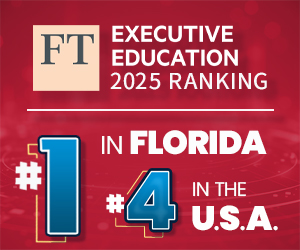Program Information
Overview of Program Information
-
The Master of Science with Major in Data Science and Analytics (MSDSA) is a multi-college interdisciplinary program jointly administered by the Department of Mathematical Sciences in the Charles E. Schmidt College of Science, the Department of Computer & Electrical Engineering and Computer Science in the College of Engineering and Computer Science, the Department of Information Technology and Operations Management in the College of Business and the Department of Political Science in the Dorothy F. Schmidt College of Arts and Letters. The program aims to prepare students with essential skill sets needed to analyze small, fast, big, massive and complex data. To allow for maximum flexibility in career aspirations, students may select from four concentrations:
Data Science via Scientific Inquiry Concentration, Department of Mathematical Sciences.
Data Science and Engineering Concentration, Department of Computer & Electrical Engineering and Computer Science. (This concentration is also available fully online.)
Data Science in Business Concentration, Department of Information Technology and Operations Management.
Data Science in Society Concentration, Department of Political Science.
College of Business Program Sheet
- Additional details about the version of the program offered by the College of Business can be found in the document below:
Comparing Business Analytics to Data Science and Information Technology
| Description: | Business Analytics | Data Science | Information Technology |
| What is the core definition of each program? | Business Analytics is the practice of analyzing business data through statistical techniques to uncover meaningful insights that drive organizational performance and inform decision-making. | Data Science is a multidisciplinary field that analyzes data through the application of statistical methods, algorithms, and technological tools to extract knowledge and insights from structured and unstructured data. | Information Technology Management is the study of technology strategy and the alignment of technology solutions to solve business problems and drive organizational efficiency. |
| How does each program prepare graduates to contribute to organizational success? | Graduates help organizations achieve competitive advantage by transforming raw data into actionable business insights that drive performance improvements and strategic decision-making. | Graduates push the boundaries of data analytics by creating new computational capabilities that organizations leverage to gain deeper insights, predict outcomes, and achieve strategic objectives. | Graduates enable organizations to leverage technology for improved operational efficiencies, streamlined processes, and competitive advantage in their markets. |
| What is the primary orientation of each program: strategic, technical, or both? | Primarily strategic—focuses on interpreting what analytical findings mean for the business and how to act on them. | Primarily technical—focuses on determining which mathematical and computer science concepts to apply for efficient and accurate data analysis. | Both strategic and technical—bridges the gap between business needs and technology solutions to align organizational goals with IT capabilities. |
| Does the program require domain-specific expertise or is it broadly applicable? | Domain-specific—business domain expertise is essential for effective implementation, as analysts must understand industry context to deliver meaningful results. | Broadly applicable—treats data as numerical abstractions, making skills transferable across industries without requiring specific domain expertise. | Broadly applicable—encompasses various technology domains and applies technology solutions to address business problems across multiple industries. |
| How do graduates use results to enable business transformation? | Graduates empower business decision-makers with actionable insights that inform both strategic planning and day-to-day operational decisions. | Graduates advance research and technical capabilities, developing models and algorithms that organizations can operationalize for business applications. | Graduates apply technological solutions to resolve business problems, optimize processes, and drive organizational value through digital transformation initiatives. |
| What core business questions do graduates of each program answer? | Graduates combine analytical rigor with business acumen to answer: "Why does this matter, and what should we do about it?" They translate data into practical recommendations. | Graduates leverage algorithm-based approaches, machine learning models, and AI-powered systems to answer: "What patterns exist in the data, and how can we predict future outcomes?" | Graduates focus on articulating the direct impact of technology initiatives on organizational performance, answering: "How can technology solve this business problem and deliver measurable value?" |
| What types of business problems is each program best suited to address? | Best suited for situations where a specific business question has been identified and relevant data is available for structured analysis and interpretation. | Best suited for exploratory analysis, pattern discovery, and predictive modeling without requiring specific, predetermined questions about the data. | Best suited for investigating business process improvements, technology implementations, and validating IT solutions that address operational challenges. |
| What types of trends and patterns does each program teach graduates to identify? | Graduates learn to discover trends and patterns that are relevant to specific business contexts, objectives, and key performance indicators. | Graduates learn to analyze and uncover trends and patterns of all types using advanced computational methods, regardless of industry or domain. | Graduates learn to identify technology trends and patterns specific to business operations and apply IT solutions to address them. |
| What level of coding proficiency does each program require? | Moderate coding proficiency—emphasizes statistical methods, data visualization, and interpretation using tools like SQL, Python, and R for analytical purposes. | Advanced coding proficiency—requires significant programming skills combining traditional analytical methods with computer science expertise in Python, R, and specialized libraries. | Basic to moderate coding proficiency—focuses on scripting for automation, basic Python, and working with business applications rather than custom development. |
| What statistical and quantitative methods framework does each program emphasize? | Emphasizes fundamental statistical concepts including regression, hypothesis testing, forecasting, and descriptive analytics. Covers all four analytics types: Descriptive (what happened), Diagnostic (why it happened), Predictive (what will happen), and Prescriptive (what should we do). | Emphasizes advanced statistical methods, machine learning algorithms, and computational techniques. Focuses heavily on Predictive and Prescriptive analytics while utilizing Descriptive and Diagnostic methods for data preparation and model validation. | Applies fundamental quantitative principles to support business objectives and technology decisions. Utilizes Descriptive and Diagnostic analytics to assess current state, with exposure to Predictive and Prescriptive analytics for strategic IT planning. |
| What technology tools and platforms does each program utilize? | Leverages Excel, Tableau, Power BI, SQL, Python, SPSS, SAS, Google Analytics, and emerging AI tools. Emphasizes statistical methods, forecasting, predictive modeling, and data storytelling. |
Centers on mathematical theory, algorithmic techniques, and custom code implementation. Utilizes Python, R, TensorFlow, machine learning libraries, and AI/LLM frameworks.
|
Utilizes Microsoft Office applications, Power BI, introductory Python scripting, project management platforms, ERP systems, and emerging AI tools for business applications. |
| How does each program address privacy, compliance, and data governance? | Integrates stakeholder privacy considerations into analytical technique selection and establishes responsible data management practices aligned with business ethics. | Focuses primarily on technical methodologies; privacy and governance frameworks are typically addressed at the implementation stage rather than during model development. | Emphasizes developing organizational policies, ensuring regulatory compliance, protecting privacy, overseeing data lifecycle management, and establishing robust security and governance frameworks. |
| In which industries and sectors are graduates most commonly employed? | Widely employed across finance, healthcare, marketing, retail, supply chain operations, economics, telecommunications, and consulting. | Employed in technology, healthcare, finance, e-commerce, manufacturing, research institutions, and organizations advancing machine learning and artificial intelligence. | Essential across all sectors including finance, healthcare, retail, government, education, manufacturing, energy, transportation, and professional services—spanning SMBs to multinational corporations. |



















